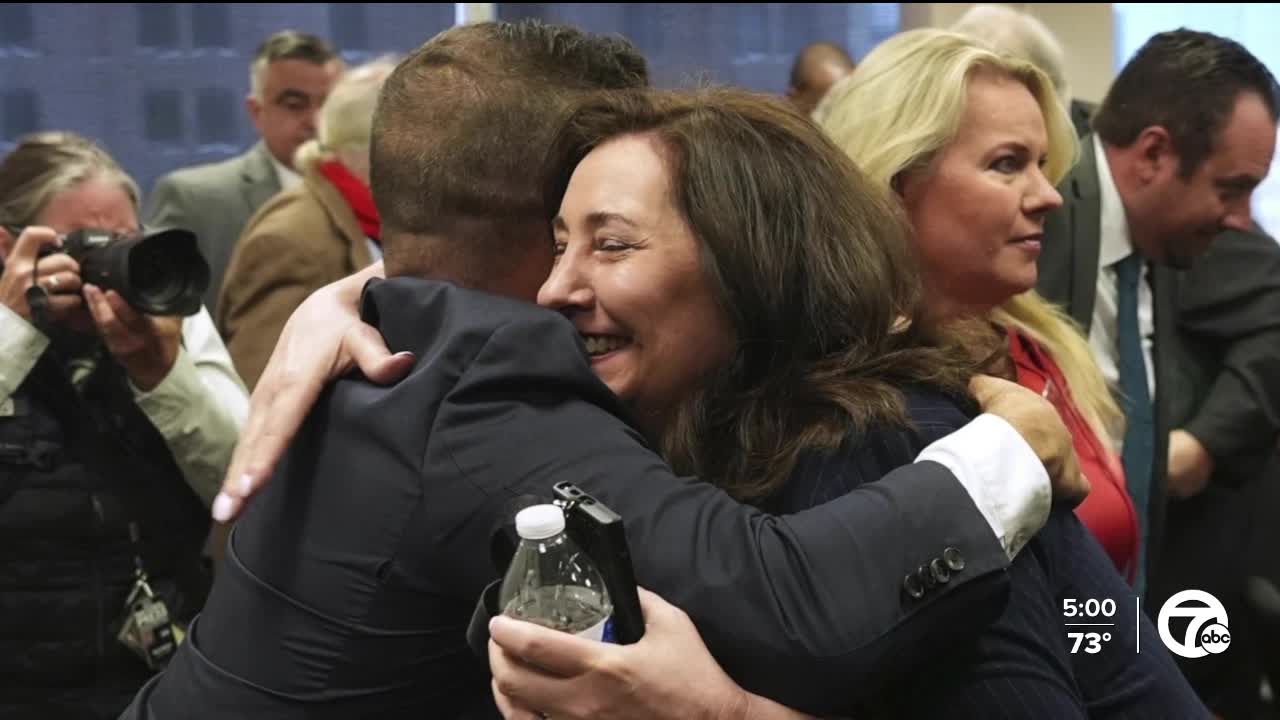LANSING, Mich. (AP Modified) — A Michigan judge dismissed criminal charges Tuesday against a group of people who were accused of attempting to falsely certify President Donald Trump as the winner of the 2020 election in the battleground state, a major blow to prosecutors as similar cases in four other states have been muddied with setbacks.
Watch Whitney Burney's video report:
District Court Judge Kristen D. Simmons said in a court hearing that the 16 Republicans accused will not face trial. The case has dragged through the courts since Michigan Attorney General Dana Nessel, a Democrat, announced the charges over two years ago.
Simmons said she saw no intent to commit fraud in the defendants’ actions. Whether they were “right, wrong or indifferent,” they “seriously believed” there were problems with the election, the judge said.
“I believe they were executing their constitutional right to seek redress,” Simmons said.
Each member of the group, which included a few high profile members of the Republican Party in Michigan, faced eight charges of forgery and conspiracy to commit election forgery. The top felony charges carried a maximum penalty of 14 years in prison.
Meshawn Maddock was one of the defendants in the case.
"There was no criminal intent. There was absolutely nothing proven in any way that we were at fault of any of the things we were charged with, horrible things that we were charged with. I was looking at 84 years in prison and it’s taken us 2.5 years to fight this," said Maddock.
Maddock says while Tuesday was a victory, she is still upset that she believes she was targeted for her loyalty to President Trump.
"These were false charges against good people, innocent people,' said Maddock. "We went on Facebook live and said that we were never meant to replace the electors that were in the capital, that what we were doing was signing a document to go alongside in case it was needed. If the election in 2020 had been revealed to have been stolen, like I know that it was, then the paperwork that we did would have been necessary."
Maddock says to this day she still believes the 2020 presidential election was stolen, despite no evidence of widespread voter fraud ever being found. She says she is now exploring her litigation options as she believes her civil rights were violated.
Attorney Kevin Kijewski, who represented Clifford Frost Jr., another defendant in the case, also touting Tuesday's ruling as a victory.
View his full interview with 7 News Detroit here:
Supporters, friends and family crowded in the hallway outside the courtroom cheered when the judge said the cases would be dismissed. Defendants leaving the courtroom cried and hugged friends and family. One woman wept as she hugged another and said, “We did it.”
Investigators said the group met at the Michigan GOP headquarters in December of 2020 and signed a document falsely stating they were the state’s “duly elected and qualified electors.” President Joe Biden won Michigan by nearly 155,000 votes, a result confirmed by a GOP-led state Senate investigation in 2021.
Electors are part of the 538-member Electoral College that officially elects the president of the United States. In 48 states, electors vote for the candidate who won the popular vote. In Nebraska and Maine, elector votes are awarded based on congressional district and statewide results.
One man accused in the Michigan case had the charges against him dropped after he agreed to cooperate with the state attorney general’s office in October 2023. The other 15 defendants pleaded not guilty and have maintained that their actions were not illegal.
Prominent Michigan MAGA activist and former Michigan Republican Party Co-Chair Meshawn Maddock was one of the accused. Her attorney, Nicholas Somberg, told reporters after the hearing that the case brought by the attorney general's office was a waste of money and a “malicious prosecution.”
“There needs to be major consequences for the people who brought this," he said.
Simmons, who was appointed by Democratic Gov. Gretchen Whitmer, took nearly a year to say whether there was sufficient evidence to bring the cases to trial following a series of lengthy preliminary hearings. In her remarks Tuesday, Simmons said the case was not about who won the 2020 election, but about the intent of the people charged.
“This is not an election interference case,” she said.
Prosecutors in Nevada, Georgia, Wisconsin and Arizona have also filed criminal charges related to the fake electors scheme. None of the cases have neared the trial stage and many have been bogged down by procedural and appellate delays.
In Nevada, the state attorney general revived a case against a group of allegedly fake electors last year, while a judge in Arizona ordered a similar case back to a grand jury in May. In Wisconsin last month, a judge declined to dismiss felony charges against three Trump allies connected to a plan to falsely cast electoral ballots for Trump even though Biden won the state in 2020.
The Georgia prosecution is essentially on hold while Fulton County District Attorney Fani Willis in Atlanta, who brought the charges against President Trump and others appeals her removal from the case. Technically, Trump is still a defendant in the case, but as the sitting president, it is highly unlikely that any prosecution against him could proceed while he’s in office.
The effort to secure fake electors was central to the federal indictment against Trump that was abandoned earlier this year shortly before Trump took office for his second term.




